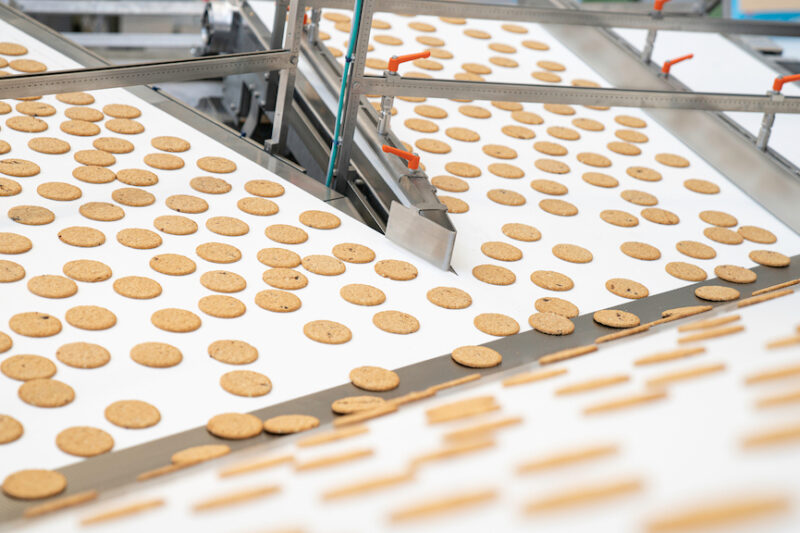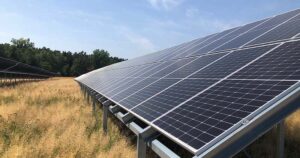Special focus: Preparing for the future of biscuits and cookies

pic: Syntegon
Confectionery Production examines the latest innovations in cookie and biscuit products and technology, and how they are meeting trends while ensuring compliance with health and sustainability requirements. Daisy Phillipson reports
Biscuits and cookies have always been a versatile sector, with recent NPD reflecting the wide variety of tastes and demands worldwide. From adventurous and global flavours and formats to healthy and functional reformulation, the possibilities are endless. Alongside diet and lifestyle requirements, legislative changes are making an impact. Manufacturers are increasingly relying on automated machinery and sophisticated technology in order to maintain productivity, cater to the requirements of customers and ensure compliance with increasingly stringent regulations.
Sustainability is high on the agenda, having gone from being a megatrend to a necessity. This was reflected in the fourth annual State of Snacking report from Mondelēz International, the food company behind some of the biggest names in this sector including Oreo, Chips Ahoy! and Ritz. Developed in partnership with consumer polling specialist The Harris Poll, the analysis found that 72 per cent of people stated they would prioritise product ranges with reduced levels of packaging, backed up by 72 per cent agreeing that they would typically recycle items. Meanwhile, three quarters of participants consider plant-based snacks to be better for the future of our planet.
A majority of major players in the biscuit and cookie arena have committed to company-wide sustainability goals and initiatives, including Mondelēz, which has pledged for 100 per cent of its packaging around the globe to be recyclable by 2025. Additionally, in February, as part of its drive towards net zero greenhouse gas emissions across its operations by 2050, the company unveiled a 12-year agreement with clean energy investor GoldenPeaks Capital. The project will see Mondelēz supplied with carbon-free, renewable electricity produced by various solar power plants for the manufacturer’s Polish sites.

The snack giant also launched Harmony Ambition 2030, the next stage of its advanced third-party verified Harmony wheat sustainability programme, which has been considered critical for environmentally-mindful production of its biscuit manufacturing. The initiative is centred on the delivery of regenerative agriculture that aims to mitigate climate change and reverse biodiversity losses through supporting farmers in investing in improved practices.
Preparing for HFSS regulations
It’s a similar story with other biscuit and cookie manufacturers and their partners, including snack food business Pladis UK and Ireland, which aims to make all of its plastic packaging recyclable, reusable or compostable by 2025. In addition to eco-friendly practices, another important focus for the sweet snack sector is tackling obesity rates and promoting healthy living, especially as new regulations are introduced. Last year, the UK government began to roll out plans for providing restrictions on the promotion and placement of foods and drinks that are high in fat, salt or sugar (HFSS).
Pladis has responded to the news by reformulating recipes in line with the proposed restrictions, including the 2020 announcement that it had reduced sugar in nine of its biscuit favourites. In March 2022, the firm added McVitie’s Rich Tea Delights to the range, a lighter version of the snack but with 30 per cent less sugar and just 38 calories per biscuit. And a few months later saw the introduction of McVitie’s Digestives Wholesense, containing 30 per cent less sugar and 50 per cent more fibre than the original biscuits. The company explained that the reduced sugar recipes will be exempt from the government’s upcoming HFSS restrictions.
Additional offerings to the healthy snack market include HighKey, which launched its new Sandwich Cookies earlier this year. Offering customers a cocoa biscuit with vanilla-flavoured cream filling, each two-cookie serving has 0g of sugar, 2g net carbs, 7g of fibre and 60 calories, as well as being gluten-free, soy-free and keto-friendly. Elsewhere, for those dedicated to the ketogenic lifestyle, The Keto Collective introduced its range of Keto Cookies, which are gluten-free and contain no artificial sweeteners. Each cookie contains just 1.5g net carbs, making them an ideal snack for those sticking to a low-carb diet.
Permissible indulgence in 2023 and beyond
In addition to the increased focus on both personal and planet health, a factor heavily impacting the biscuit and cookie segment is the cost of living crisis. Since snacks are an affordable treat, permissible indulgence continues to be a significant trend. Mondelēz’s analysis found that three in four customers across the globe (78 per cent) attest that it’s now more important than ever to have these moments of indulgence in the day.
The firm’s CEO and chairman, Dirk Van de Put, comments: “Consumers continue to turn to snacking as an accessible, affordable treat to ease or reward the demands of daily life. Despite rising grocery costs, three-quarters (75 per cent) of consumers agree they always find room in their budget for snacks, especially millennials (80 per cent).”
A growth area within this trend is nostalgic treats with exciting new twists, which has been reflected in NPD. Mondelēz’s Chips Ahoy!, for example, recently announced the launch of a new cookie variety: Chewy Confetti Cake Cookies. Inspired by the brand’s 60th anniversary, the snack aims to share the celebration with customers, comprising confetti cake-flavoured chewy cookies with colourful rainbow sprinkles. Elsewhere, Ferrero offered Nutella fans a twist on its famed product by introducing Nutella B-Ready and Nutella Biscuits. The former is a crispy wafer shell filled with Nutella and sprinkled with puffed wheat crisps, while Nutella Biscuits feature crunchy biscuits with a heart-shape filled with the beloved hazelnut cocoa spread.

Ticking the boxes of permissible indulgence is the new Super Stuffed line from dessert specialist Doughlicious, also known as the London Dough Company. The range comprises double-stuffed cookies with gooey and indulgent centres that melt when heated. There are a number of flavours available, including Jaffa Wannabe, YO-Berry and Inside Out Churro. There’s also a vegan option: O.G Salted Chocolate Chip. As well as offering enticing flavours and textures, all Doughlicious products are made using sustainably-sourced, natural ingredients without any added refined sugars, artificial additives or preservatives. The company has also found a way to minimise and upcycle food product waste from its ready-to-bake line of cookies, demonstrating its commitment to sustainability.

Optimum efficiency with smart systems
Just as we have seen with NPD, machinery manufacturers continue to innovate with updated systems and technology, allowing operators within the biscuit and cookie sector to cater to new trends. Packaging and processing group Syntegon, for example, launched its Distribution Continuous Slide (DCS), a new highly flexible discharge station for round cookies, crackers and biscuits.
Addressing the issue of food loss, the modular discharge system, which consists of one or more stations arranged one behind the other, is equipped with belt slides for particularly gentle handling. This detail is said to minimise mechanical stress and therefore reduce product breakage and loss.
In terms of pack style flexibility, the Syntegon DCS distributes cookies onto belt legs for packing them flat or on-edge into pile, slug or tray packs. For a format change, users can simply modify the belt speeds via the HMI module and save them as a new format. Additionally, the system’s guard-free design provides operators with unrestricted process visibility, safe accessibility and easy cleaning.
Discussing how the DCS can handle fluctuating production volumes, Daniel Bossel, Global product manager at Syntegon, says: “If the product build up on a leg belt becomes too long, the DCS automatically discharges fewer products onto that leg. At the same time, it distributes the surplus to the next stations, automatically increasing their discharge capacity. All legs can continue to operate constantly until the product storage is empty.”
For its part, snack production systems manufacturer Reading Bakery Systems (RBS) recently introduced an advanced Thomas L. Green WCX Wirecut Machine, offering more product flexibility, control, better safety features and easier sanitation than previous designs.
The updated machine has an expanded range of product capabilities, including standard and filled bars, multi-colour products, filled and encapsulated cookies and frozen dough applications, among others. As well as being capable of uniformly cutting individual shapes with a wireframe assembly, an optional ultrasonic attachment can be used for materials that are more difficult to cut and separate cleanly.
With the WCX Wirecut Machine, recipe-driven linear servo motors provide flexibility, and adjustments can be made via the integrated touchscreen while the system is in operation. RBS explains how the machine has been designed with over 50% less parts than standard wirecut models along with tool-less product changeover, making it easy to clean and maintain.
“The WCX Wirecut Machine is truly impressive, as it blends our latest sustainable design approach and SafeShield sanitary protocols with unmatched RBS technology,” says Sam Pallottini, director of cookie, cracker and pet food systems sales.
“Our focus on innovation means we’re delivering the maximum in production flexibility and efficiency to our customers.”
Driving down costs with Industry 4.0
Flexibility and efficiency are the key to overcoming the issues facing the sector today. As explained by Keith Graham, business development manager at equipment group Baker Perkins: “At a time of dramatically increasing energy costs and potential energy shortages, containing costs by minimising production overheads through improved efficiency and the application of technology are clearly essential for biscuit and cookie manufacturers.” The development and application of modern control systems and Industry 4.0 solutions are helping manufacturers to achieve business objectives.
Baker Perkins’ policy is to provide all machines ‘Industry 4.0 Ready’ to a level that allows interconnection with other systems via the internet. The eWON Flexy modular router and data gateway has been used for some time by the company, allowing linkage to remote devices with benefits based around data acquisition, handling and transmission. Using the unit, Baker Perkins is able to dial into customer’s control systems anywhere in the world and, with permission and internet access, login to a machine to carry out fault-finding and software updates.
“Baker Perkins can also remotely commission and start-up new unit machines throughout the world, including those for the biscuit and cookie industries,” adds Graham. Engineers and process technologists in the UK work with the customer’s engineers using video links and software access to provide step-by-step guidance through the process, meaning commissioning, start-up and training costs and time can be significantly reduced.
In the context of energy consumption, an oven is a significant user within a biscuit line, and another area where smart solutions can help. Baker Perkins’ TruBake HiCirc oven, for example, uses a high-rate direct convection heating system which is said to combine low energy consumption with high product quality and throughput. “Precision control of temperature and airflow above and below the band creates a stable and predictable environment that minimises fuel consumption,” says Graham. Baking can be achieved at a lower temperature by increasing the volume and velocity of the convection air. This is enhanced by a return system that quickly removes spent air from the baking surface and prevents the slowing of heat transfer to the product.
Another way to manage energy costs is to examine alternative heating methods. Electricity and hydrogen are alternatives to gas, and Baker Perkins can adapt ovens to use these options which can provide future sustainability and security. “Optimum oven heating methods are, of course, dependent on local conditions around the world,” says Graham, which is why it’s important to find a provider with expertise and know-how to deliver the optimum solution for each individual case.
Running on renewable energy
When upfront investment is on the higher end of the scale, the possibilities for sustainable biscuit production reach new heights. A perfect example comes from equipment and systems firm GEA Group, which teamed up with household products brand Violeta to bring a bakery manufacturer back to life by installing a sustainable soft-dough production line that runs on renewable energy. In 2019, when Violeta acquired Lasta, the entire Balkans-based factory was rebuilt, the recipes were revised and now output has increased to 2.5 million cookies per day.
As well as the quality and reliability of its equipment and support, one of the deciding factors in opting for GEA as a technology partner was its approach to sustainable manufacturing and production.
The company itself recently announced its climate strategy goals and a commitment to achieve net-zero greenhouse gas emissions throughout its entire value chain by 2040. By using more renewable power, GEA plans to prioritise its environmental roadmap and further develop sustainable solutions for companies working in multiple sectors.
An example of this approach is its range of electric ovens, which use tubular electric heaters instead of direct gas burners for the heating source, providing a clean baking solution. Additionally, GEA’s tunnel ovens are built with insulating material that uses high-density rock wool, ensuring that minimal heat is lost through the oven walls and the exterior of the oven stays cool. And an automatically controlled extraction damper helps to save energy and reduce emissions. The new soft-dough line also comprises a rotary moulder and an extruder for the production of soft-baked cookies.
But perhaps most exciting of all is the capability for solar electricity. “GEA were very open to our new ideas, including the use of an oven that used electrical energy instead of gas,” says Marija Tolić, project leader, Lasta. “It’s actually powered by more than 2000 photovoltaic panels that are on the roof and all around the factory, which means that we’re not dependent on the current energy market or affected by geopolitical upheavals.” Ultimately, production has been rebooted and the project allows Lasta to bring products back to market with better raw materials, automated production and improved packaging, demonstrating the power of combining innovation and sustainability.



